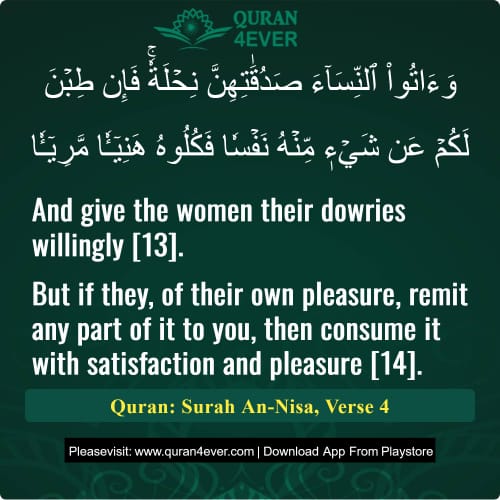
Transliteration:( Wa aatun nisaaa'a sadu qaatihinna nihlah; fa in tibna lakum 'an shai'im minhu nafsan fakuloohu hanee'am mareee'aa )
"And give the women their dowries willingly [13]. But if they, of their own pleasure, remit any part of it to you, then consume it with satisfaction and pleasure [14]."
From this emerge two rulings:
Only the wife is entitled to the Mehr, not her guardian.
It becomes incumbent on the husband to obtain legal possession of the wife.
There are three types of Mehr:
Mehr-e-Mua'jjal (immediate)
Mehr-e-Muwa'jjal (deferred)
Mehr-e-Ghair Musarrah (unspecified)
The laws pertaining to each are different. In Mehr-e-Mua'jjal (1), the wife can demand her Mehr before the consummation of the marriage.
Some Ulema deduce that the Mehr of the wife is a sacred trust. If someone’s sick child is not recovering, then treatment may be done using the Mehr money.
It is said that Durood Shareef was the first Mehr given by Hazrat Adam to Sayeda Hawa, the mother of mankind—thus showing its spiritual value and healing power.
However, this is only acceptable when:
The wife agrees willingly to give that amount.
It is absolutely unlawful to take Mehr forcefully.
Hence, there is no contradiction between this verse and another where Allah says:
"Then take not anything thereof." (Surah An-Nisa, Verse 20)
The tafsir of Surah Nisa verse 4 by Ibn Kathir is unavailable here.
Please refer to Surah Nisa ayat 2 which provides the complete commentary from verse 2 through 4.
(4:4) Give women their bridal-due in good cheer (considering it a duty); but if they willingly remit any part of it, consume it with good pleasure.[7]
7. In the opinion of ‘Umar and Shurayh, if a woman gives up either the whole or a part of the bridal-due (mahr) in favour of her husband and later reclaims it from him then he is bound to pay it. The claim on the woman’s part would be tantamount to her unwillingness to remit either the whole or a part of the bridal-due. For further details see the section entitled ‘Mahr’ in my book Huquq al-Zawjayn, 16th edition, Lahore, 1976, pp. 31-3 and 119-23.
[161]- The obligatory bridal gift (mahr). [162]- Knowing that it is lawful.

For a faster and smoother experience,
install our mobile app now.
Related Ayat(Verses)/Topics